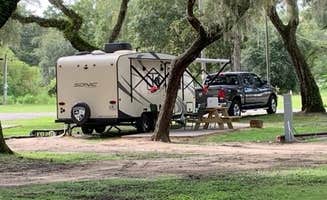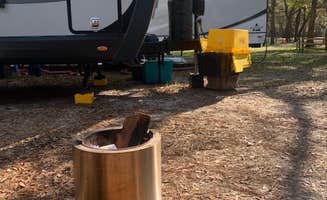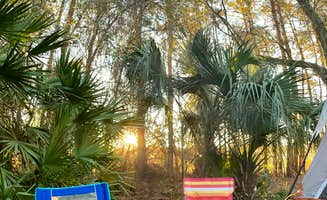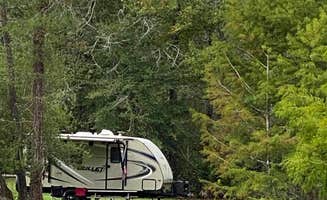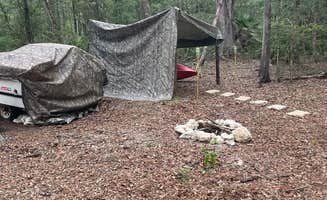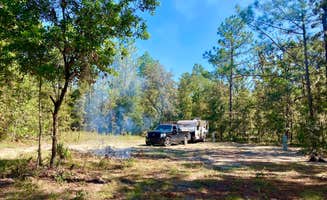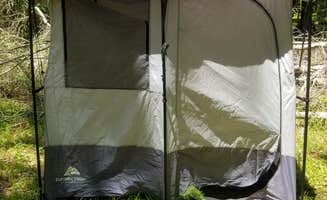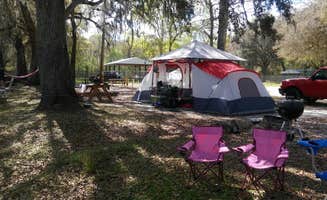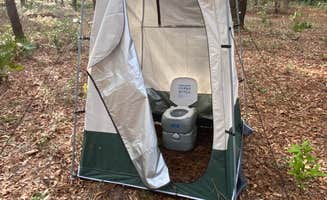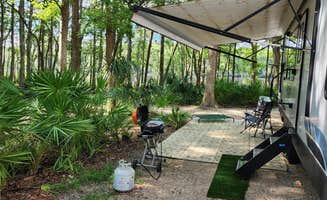Campgrounds near Trenton, Florida range from established state parks to family-operated facilities with direct access to natural springs and the Suwannee River. The region sits at elevations between 40-60 feet above sea level, part of Florida's karst topography where underground limestone creates the area's signature spring systems. Most camping areas maintain cooler temperatures near water features despite summer highs reaching 90°F with accompanying humidity.
What to do
Springs exploration: Dive, snorkel, or swim year-round. At Manatee Springs State Park Campground, visitors can explore crystal-clear 72°F waters while potentially spotting wildlife. "You will definitely see some manatee but swimming up close is a no no. The springs themselves are cold and dark and look better in pictures(at least this time of year) on a hot summer day could be refreshing," notes Kat A.
Paddle the Santa Fe and Suwannee Rivers: Bring or rent equipment. Gilchrist Blue Springs State Park Campground offers direct access to paddle routes. "The spring is AMAZING!!! When you camp here you can use the spring before and after those who come for day use (there are a lot). I'm the evenings we had the spring to ourselves," reports Jenn B. Rental costs average $30-50 per day depending on vessel type.
Trail walking: Morning wildlife viewing opportunities. Many parks feature boardwalks and nature paths. One camper at Suwannee River Hideaway mentioned, "Beautiful wooded campsites... The campground backs up to an amazing field for stargazing. The Suwannee River can be hiked to!" Walking trails generally connect camping areas to water features within a quarter to half-mile distance.
What campers like
Clean facilities: Modern bathhouses at most campgrounds. The newer parks often receive compliments on amenities. At Dogwood Campground — O'Leno State Park, visitors appreciate infrastructure maintenance. "Everything was well marked, clean, and really have nothing negative to say. It was fully booked and crowded but didn't feel crowded. Easy access to bathrooms," writes Towson F.
Quiet evenings: Most parks enforce noise regulations. Campers value the peace found at these rural locations. "This campground is super quiet and nestled in Florida cow country. The bathrooms are new and very well kept," notes Kelsey G. about Hart Springs Park. Exceptions occur during holiday weekends when some campgrounds reach capacity.
Wildlife encounters: Deer, birds, occasional reptiles. Natural springs attract diverse species. "We saw a couple of manatees. Free hot showers. No laundry machines. No trash bins in park, all trash must be taken to dumpsters near park entrance," explains Laura M. at Manatee Springs. Wildlife viewing peaks during early morning and evening hours.
What you should know
Water levels fluctuate seasonally: Check spring conditions. Heavy rains can affect water clarity and access. "Unfortunately Hart springs was closed while we were there due to flooding and construction but should be open for spring 2019, but it looks like an incredible swimming spot with ample space, tables and pavilions," reports one visitor about Hart Springs Park.
Reservations essential during peak periods: Book 3-6 months ahead. State parks fill quickly December through April. "We came in the winter and it was a bit cold to swim, but there are plenty of boardwalks around the rec side of the park to tour the sights," notes Jessica C.
Cell service varies significantly: Some parks offer WiFi hotspots. Coverage can be limited in rural locations. "Poor/spotty cell service in park, but there's free wifi at the concession stand. Concession stand was closed when we were there but there was still ok wifi that reached outside," explains one camper.
Tips for camping with families
Swimming areas with supervision: Check depth restrictions. Some springs feature designated areas for younger swimmers. At Suwannee River Bend RV Park, amenities cater to all ages. "Great RV Park with full hookups, on the suwannee with kayak and canoe rentals. Super nice shower room witha shampoo, conditioner and body wash dispenser available for free in each stall," notes liz S.
Kid-friendly campgrounds: Look for playgrounds and open spaces. Several parks provide recreational facilities beyond water features. "We liked this campground a lot. With taxes and fees and the $7 RV surcharge (at all Florida State Parks) it came to about $30/night for full hookups," shares Laura M.
Spring water safety: Always check temperature before entry. The consistent 72°F water feels colder than expected to many children. "The springs were gorgeous and the swimming area is large. We came in the winter and it was a bit cold to swim," mentions one reviewer.
Tips from RVers
Site selection matters: Ask about ground surface type. Many campgrounds feature sand or compacted dirt that can challenge leveling. At Otter Springs Park & Campground, campers find varied conditions. "Sites are spacious enough - not too close together but not much privacy either. If you do not like noise choose a sight away from the pool! RV sites have Full hookup: Electric (30& 50 amp.), water, and sewer," advises Jeanene A.
Utility placement variations: Bring extra-length hoses and cords. Site layouts sometimes place connections in unusual spots. "Site 1 in particular requires a looooooong hose. The hookups are all over the place and we couldn't even use water because of that," warns Ashlee R. about Gilchrist Blue Springs.
Dump station access: Not all parks offer on-site facilities. Check availability before arrival, especially for longer stays. "No trash bins in park, all trash must be taken to dumpsters near park entrance," notes one camper about waste management procedures.


